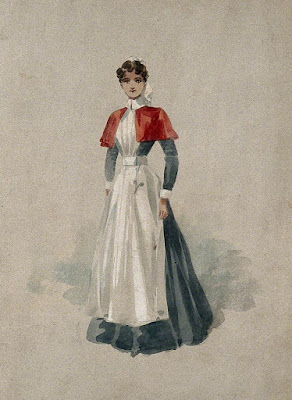Nurses' Pay
 |
| An English Hospital Nurse in Full Uniform unknown artist Photo Credit: Wellcome Collection [Public Domain] |
Ahead of an unprecedented week of strike action involving both nurses and ambulance workers, Mr Barclay [The Health Secretary] and the government continue to hide behind the fiction that the recommendation of the independent NHS pay review body - which suggested a pay increase of around 4% for nurses - must be the last word on the matter. "Ultimately, independent bodies are there for a reason," suggested the health secretary last week. "to take the politics out of this kind of stuff."
As Mr Barclay will know, this is disingenuous nonsense. "Politics" - specifically the politics of austerity - led the current chancellor, Jeremy Hunt, to reject a pay rise recommendation from the review body in 2014 as "unaffordable". Between 2010 and 2017, nurses' average earnings fell by 1.2% a year in real terms. This was not down to supposedly apolitical deliberations by the review board; it was a result of a seven-year government-imposed public sector pay freeze...
Weekend polls suggested that support for nurses is growing, with close to two-thirds of the population now backing the industrial action.
(Editorial, The Guardian, 2022)
Week one was a win for the nurses. The government banked on public anger when they walked out, but instead public support rose. It must rattle No 10 when even The Express splashes front pages backing the nurses, day after day... Yesterday, the paper quoted a poll showing that 68% of the public support their strike.
According to another new poll, 50% of voters want the government to negotiate with all of the public sector to pay them more, with just 23% backing implacability...
 |
| The Workhorses Ruben James Eynon (b 1972) Photo Credit:? [CC BY-NC-ND] |
The Sunday Times - usually trenchantly rightwing - states baldly, "NHS staff need to be paid more - particularly nurses who bear much of the emotional and physical strain of frontline work, yet have seen their real-terms pay fall by 20% over the last decade."...
Unions have been calmly settling with private employers in a labour market short of people, from Rolls-Royce and Airbus to Liverpool docks. The private sector has had a 7% raise up to November this year, while the public sector had below 3%: that shocking difference, says the Office for National Statistics is among "the largest we have seen". But take this back to 2010 and the gap yawns far wider: [Ben] Zaranko of the IFS [The Institute for Fiscal Studies] tells me that the private sector has seen a 5.5% real terms rise in those twelve years, while the public sector suffered a 5.9% fall... That gap is impossible to defend - and every interviewer should ask every minister how they can justify it.
Other numbers undermine the government's broken defences. How about 20% more billionaires since the start of Covid? Or the billions lost on bad Covid contracts? Or Brexit wiping £120bn off GDP and costing the Treasury £50bn a year in tax...
The LSE Wealth Tax Commission says an annual 2% tax levied on wealth over £5m raises £18bn...
(Polly Toynbee, The Guardian, 2022)
Comments
Post a Comment